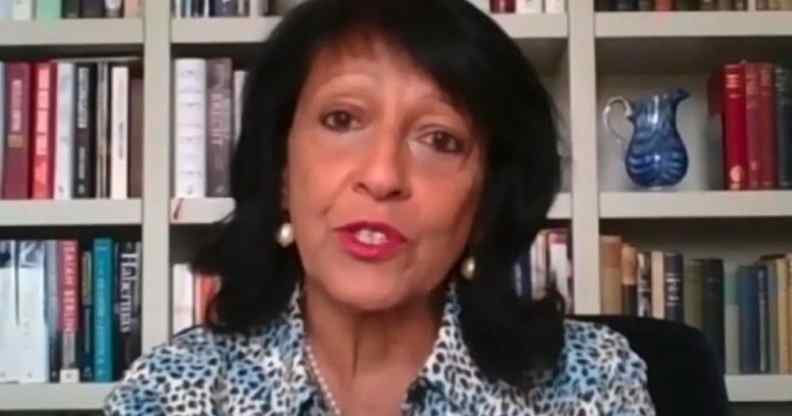‘Every major LGBT+ charity’ calls for disgraced equalities watchdog EHRC to be downgraded

EHRC chair Baroness Kishwer Falkner. (Sky News)
Stonewall and the Good Law Project, supported by more than 20 LGBT+ rights organisations, have submitted evidence to the UN to show that the UK’s Equality and Human Rights Commission (EHRC) is no longer “credible” or “fit for purpose”.
Over the last few weeks, evidence has been piling up against the supposedly independent equalities watchdog, as it recommended halting gender recognition reform in Scotland, and advised that a ban on trans conversion therapy be delayed.
Leaks have revealed how the EHRC has met with anti-trans lobby groups, and the body has seen an exodus of staff, with workers describing how it has become “transphobic” and “the enemy of human rights”.
On Thursday (10 February), it was reported that the EHRC has worked on draft guidance advising that trans people who do not hold a Gender Recognition Certificate (which is more than 99 per cent of trans people) should be excluded from single-sex spaces. The EHRC has denied any knowledge of the draft, which was seen by Vice World News and, the outlet said, aligned with a second document seen by the Good Law Project.
The Good Law Project and Stonewall, along with many LGBT+ rights groups, is now calling for the EHRC to lose its ‘A’ status, meaning it would no longer be able to make representations at the UN Human Rights Council.
On Friday (11 February) Stonewall announced that it had submitted an extensive dossier of evidence to the UN and Ganhri, a human rights network which “strengthens NHRIs [National Human Rights Institutions] to operate in line with the Paris Principles”.
NHRIs are expected to operate independently of government, and to receive an ‘A’ status from the UN, they must abide by the Paris Principles which outline the role and functions of such an institution.
In a statement, Stonewall said: “We believe that recent statements made by the Equality and Human Rights Commission (EHRC), Great Britain’s NHRI, indicate that they can no longer be considered compliant with the Paris Principles, and are no longer fit for purpose as a National Human Rights Institution.”
The submission of a 19-page dossier of evidence, the organisation said, was “prompted by the EHRC’s recent, and significant, change in stance on the issue of trans rights”.
Stonewall continued: “Their recent statements on GRA reform in Scotland, and the conversion therapy ban in England and Wales, not only reverse their long-held positions, but are in stark contrast to international human rights standards.
“The EHRC’s stance seeks to strip trans people of legal protections, and pose a grave threat to the ability of trans people to participate in daily life with dignity and respect.”
The dossier “outlines substantial evidence that reveals the numerous ways the EHRC now finds itself falling short of international standards”, it said.
Liz Truss is responsible for EHRC appointments
The commissioners of the EHRC are appointed by minister for women and equalities Liz Truss, herself widely criticised for killing reforms to the Gender Recognition Act. In 2020, Truss named Baroness Kishwer Falkner as chair of the commission.
Since her first interview after being appointed chair, Falkner has been open about her determination that the EHRC should protect “freedom of belief”, including “gender critical” beliefs, and has said that it is “entirely reasonable” to question trans people’s gender identity.
The EHRC is supposed to be independent, but Stonewall said its dossier “outlines a ‘complete absence’ of financial autonomy from the UK government, and cites ‘excessive’ governmental interference – including ‘politically motivated’ appointments to the chair and board, many of whom have repeatedly and publicly demonstrated their opposition to the expansion of human rights, and whose appointments have drawn widespread criticism from NGOs”.
While its signatories “accept that UK Government policy changes based on their democratic mandate”, NHRIs like the EHRC “should operate according to the principle of acting independently, free from political inference, and focus on upholding international human rights standards regardless of the politics of the day”.
Having that status removed would be an international humiliation that would, rightly, mark the disastrous nature of @trussliz's tenure as notional Equalities Minister.
— Jo Maugham (@JolyonMaugham) February 11, 2022
Jo Maugham, director of the Good Law Project, wrote on Twitter: “The EHRC should lose its status as an ‘A’ rated UN Human Rights Institution and, I have some confidence, will.
“It has become a tool of government where it should be independent. Having that status removed would be an international humiliation that would, rightly, mark the disastrous nature of Liz Truss’s tenure as notional equalities minister.”
Trans rights group TransActual said in a statement: “The EHRC is walking away from its duties to uphold basic human rights for trans and non-binary people. It no longer commands our confidence, and we fear what it now intends.
“It will take some strong and swift actions to convince us that it is on our side, actions we no longer think it is capable of.”
The EHRC told PinkNews in a statement: “We take all decisions impartially, based on evidence and the law, both in the UK and internationally. Our independence is guaranteed in statute.
“All appointments to our non-executive and executive roles are made through a fair, open and transparent recruitment process. The way the commission is governed and commissioners appointed is set out in the Equality Act and has not changed since the commission was established.
“Our statutory mandate and role as a National Human Rights Institution is to protect and promote equality and human rights for everyone – and that includes trans people.
“Where rights may conflict, our role is to advise on striking an appropriate balance. We uphold fairness for all, and our work is rigorous and impartial.”

